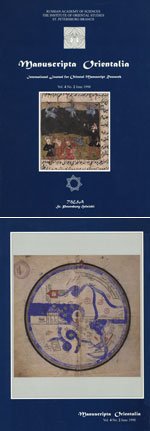|
|
| |

|

|
Pang T. [Review:] V. L. Uspensky. Prince Yunli (1697–1738). Manchu Statesman and Tibetan Buddhist. Tokyo: Institute for the Study of Languages and Cultures of Asia and Africa, 1997, VIII, 140 pp. // Manuscripta Orientalia. Vol. 4. No. 2. June 1998. P. 72.
The book under review is the first to be entirely devoted
to the activities of Prince Yunli, the seventeenth son of
the Kangxi emperor, a high official at the court of the
emperor Y ongzhen. The book presents the Imperial prince
as a Manchu statesman (chapter I), a Tibetan Buddhist
(chapter 2), as well as a bibliographer and publisher (chapter
3). In his preface, the author notifies that his publication
is addressed to specialists (“is not supposed to be casually
read but used by interested scholars”, p. VIII). The official
positions of Prince Yunli and his role in relations of the
Qing dynasty with Tibet are convincingly described in the
first two chapters which are based on the Mongolian and
Tibetan sources, supported by the English translations from
different biographies of the Buddhist lamas. These texts
clearly show, the author point out, “that the common struggle
for power, influence, rank and titles among the Tibetan
Buddhist hierarchs residing in Beijing was in full swing in
the first half of the 18th century ... To some extent, this
struggle reflected the political and religious struggle in
Tibet proper and other areas where Tibetan Buddhism was
spread” (p. 18)...
К содержанию выпуска...
 PDF-файлы PDF-файлы
Полный текст статьи
Ключевые слова
буддизм тибетский в Пекине
Юньли
|
|
|
|
Случайная новость: Объявления |
|
25–26 ноября 2024 г. в ИВР РАН пройдут ХVIII Всероссийские востоковедные чтения памяти О.О. Розенберга. |
|
Подробнее...
|
|
|
|
|

